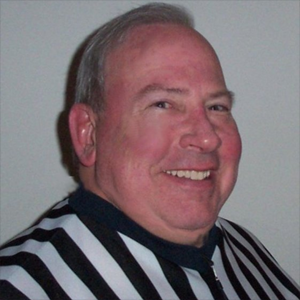
Rndballref
20 Years Experience
Chicago, IL
Male, 60
For twenty years I officiated high school, AAU and park district basketball games, retiring recently. For a few officiating is the focus of their occupation, while for most working as an umpire or basketball referee is an avocation. I started ref'ing to earn beer money during college, but it became a great way to stay connected to the best sports game in the universe. As a spinoff, I wrote a sports-thriller novel loosely based on my referee experiences titled, Advantage Disadvantage
The rule book states that a player is out of bounds if any part of his body is touching out of bounds or touching a player who is out of bounds. It also states that an airborne player has the geographical position of where he jumped from (until he lands). So the player does not by rule have to have two feet in bounds, just one as long as the other is in the air and not out of bounds.
There is no provision in the rules for an official to overrule another, and there is no prohibition against it. One of the officials is designated as the referee, the others are umpire 1 and umpire 2. The referee has to settle all disputes not envisioned by the rule book. As I have said before, I always wanted my partners to approach me if they disagreed with my call and allow me to change my own call if my partner created doubt or if they clarified the play for me. But I always wanted the right to not change my call as well. By the original caller changing his call he can explain it to the coach adversely affected. Good referees have this discussion before the game and talk about how they are going to handle a disagreement on a call. Generally, this should not happen too often because each referee has a specific area to watch and while there is some overlap calls usually fall within one ref's primary responsibility area.
The inbounder is considered a player (not a sub or a bench personnel). If the ball has achieved inbound status (in your case when the ball is touched or deflected by an inbounds player) and then the inbounder-player who status is still out of bounds, the ball is awarded to the opposite team of the inbounder, assuming the ball hit the inbounder first (before hitting the floor, bleechers, out of bounds referees, spectators).
There is no definition in the NFHS rule book of a live or dead player. There is live/dead ball definition, but not player. Team members are defined as players, substitutes or bench personnel.
Rule 7 in the NFHS rule book is the chapter on Out of Bounds and The Throw In. Section 1, Article 2b states, "The ball is out of bounds when it passes over a rectangular backboard. By excluding fan shaped backboards it means a ball passing over fan shaped is NOT out of bounds.
Antiques Dealer
 Do you think today's "stuff" will one day be collected as valuable antiques?
Do you think today's "stuff" will one day be collected as valuable antiques?
Claims Adjuster
Debate Coach
 Are presidential debates actually "debates", by the traditional definition?
Are presidential debates actually "debates", by the traditional definition?
According to theriches.com beginning NBA referees make $150,000 and senior officials make up to $550,000. In every game, one official is designated as the "referee" and the others are "officials". In NFHS, the referee has certain additional duties such as picking who will toss jump balls, giving pre-game instructions etc.. But the "referee" is not supposed to overrule the other two officials. I suspect that in the NBA, senior officials might have additional duties such as travel arrangements, meetings, training, rule advisories, etc.
When the ball goes through the basket it is a dead ball and anyone can call timeout until the team takes possession (even after a made basket by your team while on offense, until your opponent picks up the ball).
After the first of 2 free throws there will not be team possession, so either team can call time out until the ball is at the disposal of the shooter for his second free throw.
If A is standing out of bounds, and a ball that was in bounds touches him before hitting the floor out of bounds, A is considered to have caused the ball to go out of bounds.
-OR-
 Login with Facebook
Login with Facebook (max 20 characters - letters, numbers, and underscores only. Note that your username is private, and you have the option to choose an alias when asking questions or hosting a Q&A.)
(A valid e-mail address is required. Your e-mail will not be shared with anyone.)
(min 5 characters)
By checking this box, you acknowledge that you have read and agree to Jobstr.com’s Terms and Privacy Policy.
-OR-
 Register with Facebook
Register with Facebook(Don't worry: you'll be able to choose an alias when asking questions or hosting a Q&A.)